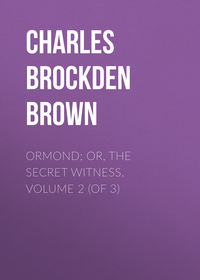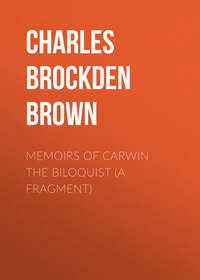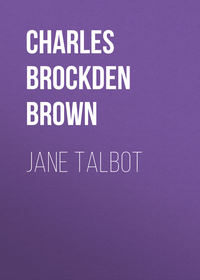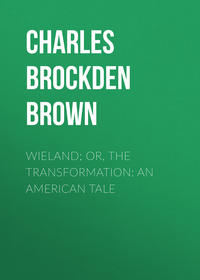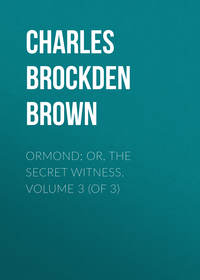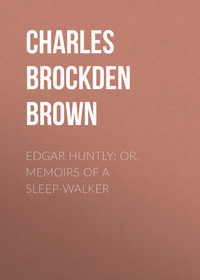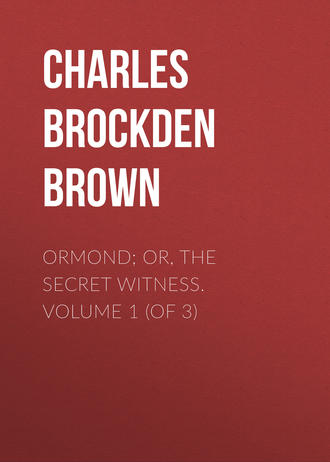 полная версия
полная версияOrmond; Or, The Secret Witness. Volume 1 (of 3)
His demeanour was tranquil and uniform. He was sparing of words, and these were uttered in the softest manner. In all his transactions he wad sedate and considerate. In his dress and mode of living there were no appearances of parsimony, but there were, likewise, as few traces of profusion.
His sister had shared in his prosperity. As soon as his affairs would permit, he sent for her to Scotland, where she had lived in a state little removed from penury, and had for some years been vested with the superintendence of his household. There was a considerable resemblance between them in person and character. Her profession, or those arts in which her situation had compelled her to acquire skill, had not an equal tendency to enlarge the mind as those of her brother, but the views of each were limited to one set of objects. His superiority was owing, not to any inherent difference, but to accident.
Balfour's life had been a model of chasteness and regularity, – though this was owing more to constitutional coldness, and a frugal spirit, than to virtuous forbearance; but, in his schemes for the future, he did not exclude the circumstance of marriage. Having attained a situation secure as the nature of human affairs will admit from the chances of poverty, the way was sufficiently prepared for matrimony. His thoughts had been for some time employed in the selection of a suitable companion, when this rencounter happened with Miss Dudley.
Balfour was not destitute of those feelings which are called into play by the sight of youth and beauty in distress. This incident was not speedily forgotten. The emotions produced by it were new to him. He reviewed them oftener, and with more complacency, than any which he had before experienced. They afforded him so much satisfaction, that, in order to preserve them undiminished, he resolved to repeat his visit. Constantia treated him as one from whom she had received a considerable benefit. Her sweetness and gentleness were uniform, and Balfour found that her humble roof promised him more happiness than his own fireside, or the society of his professional brethren.
He could not overlook, in the course of such reflections as these, the question relative to marriage, and speedily determined to solicit the honour of her hand. He had not decided without his usual foresight and deliberation; nor had he been wanting in the accuracy of his observations and inquiries. Those qualifications, indeed, which were of chief value in his eyes, lay upon the surface. He was no judge of her intellectual character, or of the loftiness of her morality. Not even the graces of person, or features or manners, attracted much of his attention. He remarked her admirable economy of time, and money, and labour, the simplicity of her dress, her evenness of temper, and her love of seclusion. These ware essential requisites of a wife, in his apprehension. The insignificance of his own birth, the lowness of his original fortune, and the efficacy of industry and temperance to confer and maintain wealth, had taught him indifference as to birth or fortune in his spouse. His moderate desires in this respect were gratified, and he was anxious only for a partner that would aid him in preserving rather than in enlarging his property. He esteemed himself eminently fortunate in meeting with one in whom every matrimonial qualification concentred.
He was not deficient in modesty, but he fancied that, on this occasion, there was no possibility of miscarriage. He held her capacity in deep veneration, but this circumstance rendered him more secure of success. He conceived this union to be even more eligible with regard to her than to himself, and confided in the rectitude of her understanding for a decision favourable to his wishes.
Before any express declaration was made, Constantia easily predicted the event from the frequency of his visits; and the attentiveness of his manners. It was no difficult task to ascertain this man's character. Her modes of thinking were, in few respects, similar to those of her lover. She was eager to investigate, in the first place, the attributes of his mind. His professional and household maxims were not of inconsiderable importance, but they were subordinate considerations. In the poverty of his discourse and ideas she quickly found reasons for determining her conduct.
Marriage she had but little considered, as it is in itself. What are the genuine principles of that relation, and what conduct with respect to it is prescribed to rational beings by their duty, she had not hitherto investigated. But she was not backward to inquire what are the precepts of duty in her own particular case. She knew herself to be young; she was sensible of the daily enlargement of her knowledge: every day contributed to rectify some error, or confirm some truth. These benefits she owed to her situation, which, whatever were its evils, gave her as much freedom from restraint as is consistent with the state of human affairs. Her poverty fettered her exertions, and circumscribed her pleasures. Poverty, therefore, was an evil, and the reverse of poverty was to be desired. But riches were not barren of constraint, and its advantages might be purchased at too dear a rate.
Allowing that the wife is enriched by marriage, how humiliating were the conditions annexed to it in the present case! The company of one with whom we have no sympathy, nor sentiments in common, is, of all species of solitude, the most loathsome and dreary. The nuptial life is attended with peculiar aggravations, since the tie is infrangible, and the choice of a more suitable companion, if such a one should offer, is for ever precluded. The hardships of wealth are not incompensated by some benefits; but these benefits, false and hollow as they are, cannot be obtained by marriage. Her acceptance of Balfour would merely aggravate her indigence.
Now she was at least mistress of the product of her own labour. Her tasks were toilsome, but the profits, though slender, were sure, and she administered her little property in what manner she pleased. Marriage would annihilate this, power. Henceforth she would he bereft even of personal freedom. So far from possessing property, she herself would become the property of another.
She was not unaware of the consequences flowing from differences of capacity, and that power, to whomsoever legally granted, will be exercised by the most addressful; but she derived no encouragement from these considerations. She would not stoop to gain her end by the hateful arts of the sycophant, and was too wise to place an unbounded reliance on the influence of truth. The character, likewise, of this man, sufficiently exempted him from either of those influences.
She did not forget the nature of the altar-vows. To abdicate the use of her own understanding was scarcely justifiable in any case; but to vow an affection that was not felt, and could not be compelled, and to promise obedience to one whose judgment was glaringly defective, were acts atrociously criminal. Education, besides, had created in her an insurmountable abhorrence of admitting to conjugal privileges the man who had no claim upon her love. It could not be denied that a state of abundant accommodation was better than the contrary; but this consideration, though, in the most rational estimate, of some weight, she was not so depraved and effeminate as to allow to overweigh the opposite evils. Homely liberty was better than splendid servitude.
Her resolution was easily formed, but there were certain impediments in the way of its execution. These chiefly arose from deference to the opinion, and compassion for the infirmities of her father. He assumed no control over her actions. His reflections in the present case were rather understood than expressed. When uttered, it was with the mildness of equality, and the modesty of persuasion. It was this circumstance that conferred upon them all their force. His decision on so delicate a topic was not wanting in sagacity and moderation; but, as a man, he had his portion of defects, and his frame was enfeebled by disease and care; yet he set no higher value on the ease and independence of his former condition than any man of like experience. He could not endure to exist on the fruits of his daughter's labour. He ascribed her decision to a spirit of excessive refinement, and was, of course, disposed to give little quarter to maiden scruples. They were phantoms, he believed, which experience would dispel. His morality, besides, was of a much more flexible kind; and the marriage vows were, in his opinion, formal and unmeaning, and neither in themselves, nor in the opinion of the world, accompanied with any rigorous obligation. He drew more favourable omens from the known capacity of his daughter, and the flexibility of her lover.
She demanded his opinion and advice. She listened to his reasonings, and revolved them with candour and impartiality. She stated her objections with simplicity; but the difference of age and sex was sufficient to preclude agreement. Arguments were of no use but to prolong the debate; but, happily, the magnanimity of Mr. Dudley would admit of no sacrifice. Her opinions, it is true, were erroneous; but he was willing that she should regulate her conduct by her own conceptions of right, and not by those of another. To refuse Balfour's offers was an evil, but an evil inexpressibly exceeded by that of accepting them contrary to her own sense of propriety.
Difficulties, likewise, arose from the consideration of what was due to the man who had already benefited her, and who, in this act, intended to confer upon her further benefit. These, though the source of some embarrassment, were not sufficient to shake her resolution. Balfour could not understand her principal objections. They were of a size altogether disproportioned to his capacity. Her moral speculations were quite beyond the sphere of his reflections. She could not expatiate, without a breach of civility, on the disparity of their minds, and yet this was the only or principal ground on which she had erected her scruples.
Her father loved her too well not to be desirous of relieving her from a painful task, though undertaken without necessity, and contrary to his opinion. "Refer him to me," said he; "I will make the best of the matter, and render your refusal as palatable as possible; but do you authorize me to make it absolute, and without appeal."
"My dear father! how good you are! but that shall be my province. If I err, let the consequences of my mistake be confined to myself. It would be cruel indeed to make you the instrument in a transaction which your judgment disapproves. My reluctance was a weak and foolish thing. Strange, indeed, if the purity of my motives will not bear me out on this, as it has done on many more arduous occasions."
"Well, be it so; that is best I believe. Ten to one but I, with my want of eyes would blunder, while yours will be of no small use in a contest with a lover. They will serve you to watch the transitions in his placid physiognomy, and overpower his discontents."
She was aware of the inconveniences to which this resolution would subject her; but since they were unavoidable, she armed herself with the requisite patience. Her apprehensions were not without reason. More than one conference was necessary to convince him of her meaning, and in order to effect her purpose she was obliged to behave with so much explicitness as to hazard giving him offence. This affair was productive of no small vexation. He had put too much faith in the validity of his pretensions, and the benefits of perseverance, to be easily shaken off.
This decision was not borne by him with as much patience as she wished. He deemed himself unjustly treated, and his resentment exceeded those bounds of moderation which he prescribed to himself on all other occasions. From his anger, however, there was not much to be dreaded; but, unfortunately, his sister partook of his indignation and indulged her petulance, which was enforced by every gossiping and tattling propensity, to the irreparable disadvantage of Constantia.
She owed her support to her needle. She was dependent therefore on the caprice of customers. This caprice was swayable by every breath, and paid a merely subordinate regard, in the choice of workwomen, to the circumstances of skill, cheapness and diligence. In consequence of this, her usual sources of subsistence began to fail.
Indigence, as well as wealth, is comparative. He indeed must be wretched, whose food, clothing, and shelter, are limited, both in kind and quantity, by the standard of mere necessity; who, in the choice of food, for example, is governed by no consideration but its cheapness, and its capacity to sustain nature. Yet to this degree of wretchedness was Miss Dudley reduced.
As her means of subsistence began to decay, she reflected on the change of employment that might become necessary. She was mistress of no lucrative art but that which now threatened to be useless. There was but one avenue through which she could hope to escape from the pressure of absolute want. This she regarded with an aversion that nothing but extreme necessity, and the failure of every other expedient, would be able to subdue. This was the hiring herself as a servant. Even that could not answer all her purposes. If a subsistence were provided by it for herself, whither should her father and her Lucy betake themselves for support?
Hitherto her labour had been sufficient to shut out famine and the cold. It is true she had been cut off from all the direct means of personal or mental gratification; but her constitution had exempted her from the insalutary effects of sedentary application. She could not tell how long she could enjoy this exemption, but it was absurd to anticipate those evils which might never arrive. Meanwhile, her situation was not destitute of comfort. The indirect means of intellectual improvement in conversation and reflection, the inexpensive amusement of singing, and, above all, the consciousness of performing her duty, and maintaining her independence inviolate, were still in her possession. Her lodging was humble, and her fare frugal, but these temperance and a due regard to the use of money would require from the most opulent.
Now retrenchments must be made even from this penurious provision. Her exertions might somewhat defer, but could not prevent, the ruin of her unhappy family. Their landlord was a severe exacter of his dues. The day of quarterly payment was past, and he had not failed in his usual punctuality. She was unable to satisfy his demands, and Mr. Dudley was officially informed, that unless payment was made before a day fixed, resort would be had to the law, in that case made and provided.
This seemed to be the completion of their misfortunes. It was not enough to soften the implacability of their landlord. A respite might possibly be obtained from this harsh sentence. Entreaties might prevail upon him to allow of their remaining under this roof for some time longer; but shelter at this inclement season was not enough. Without fire they must perish with the cold; and fuel could be procured only for money, of which the last shilling was expended. Food was no less indispensable; and, their credit being gone, not a loaf could be extorted from the avarice of the bakers in the neighbourhood.
The sensations produced by this accumulation of distress may be more easily conceived than described. Mr. Dudley sunk into despair, when Lucy informed him that the billet of wood she was putting on the fire was the last. "Well," said he, "the game is up. Where is my daughter?" The answer was, that she was up-stairs.
"Why, there she has been this hour. Tell her to come down and warm herself. She must needs be cold, and here is a cheerful blaze. I feel it myself. Like the lightning that precedes death, it beams thus brightly, though in a few moments it will be extinguished forever. Let my darling come and partake of its comforts before they expire."
Constantia had retired in order to review her situation and devise some expedients that might alleviate it. It was a sore extremity to which she was reduced. Things had come to a desperate pass, and the remedy required must be no less desperate. It was impossible to see her father perish. She herself would have died before she would have condescended to beg. It was not worth prolonging a life which must subsist upon alms. She would have wandered into the fields at dusk, have seated herself upon an unfrequented bank, and serenely waited the approach of that death which the rigours of the season would have rendered sure. But as it was, it became her to act in a very different manner.
During her father's prosperity, some mercantile intercourse had taken place between him and a merchant of this city. The latter on some occasion had spent a few nights at her father's house. She was greatly charmed with the humanity that shone forth in his conversation and behaviour. From that time to this all intercourse had ceased. She was acquainted with the place of his abode, and knew him to be affluent. To him she determined to apply as a suppliant in behalf of her father. She did not inform Mr. Dudley of this intention, conceiving it best to wait till the event had been ascertained, for fear of exciting fallacious expectations. She was further deterred by the apprehension of awakening his pride, and bringing on herself an absolute prohibition.
She arrived at the door of Mr. Melbourne's house, and inquiring for the master of it, was informed that he had gone out of town, and was not expected to return for a week.
Her scheme, which was by no means unplausible, was thus completely frustrated. There was but one other resource, on which she had already deliberated, and to which she had determined to apply if that should fail. That was to claim assistance from the superintendants of the poor. She was employed in considering to which of them, and in what manner she should make her application, when she turned the corner of Lombard and Second Streets. That had scarcely been done, when casting her eyes mournfully round her, she caught a glimpse of a person whom she instantly recognized passing into the market-place. She followed him with quick steps, and on a second examination found that she had not been mistaken. This was no other than Thomas Craig, to whose malignity and cunning all her misfortunes were imputable.
She was at first uncertain what use to make of this discovery. She followed him instinctively, and saw him at length enter the Indian Queen Tavern. Here she stopped. She entertained a confused conception that some beneficial consequences might be extracted from this event. In the present hurry of her thoughts she could form no satisfactory conclusion; but it instantly occurred to her that it would at least be proper to ascertain the place of his abode. She stept into the inn, and made the suitable inquiries. She was informed that the gentleman had come from Baltimore a month before, and had since resided at that house. How soon he meant to leave the city her informant was unable to tell.
Having gained this intelligence, she returned home, and once more shut herself in her chamber to meditate on this new posture of affairs.
CHAPTER X
Craig was indebted to her father. He had defrauded him by the most atrocious and illicit arts. On either account he was liable to prosecution; but her heart rejected the thought of being the author of injury to any man. The dread of punishment, however, might induce him to refund, uncoercively, the whole or some part of the stolen property. Money was at this moment necessary to existence, and she conceived herself justly entitled to that of which her father had been perfidiously despoiled.
But the law was formal and circuitous. Money itself was necessary to purchase its assistance. Besides, it could not act with unseen virtue and instantaneous celerity. The co-operation of advocates and officers was required. They must be visited, and harangued, and importuned. Was she adequate to the task? Would the energy of her mind supply the place of experience, and with a sort of miraculous efficacy, afford her the knowledge of official processes and dues? As little on this occasion could be expected from her father as from her. He was infirm and blind. The spirit that animated his former days was flown. His heart's blood was chilled by the rigours of his fortune. He had discarded his indignation and his enmities, and together with them, hope itself had perished in his bosom. He waited in tranquil despair, for that stroke which would deliver him from life, and all the woes that it inherits.
But these considerations were superfluous. It was enough that justice must be bought, and that she had not the equivalent. Legal proceedings are encumbered with delay, and her necessities were urgent. Succour, if withheld till the morrow, would be useless. Hunger and cold would not be trifled with. What resource was there left in this her uttermost distress? Must she yield, in imitation of her father, to the cowardly suggestions of despair?
Craig might be rich: his coffers might be stuffed with thousands. All that he had, according to the principles of social equity, was hers; yet he, to whom nothing belonged, rioted in superfluity, while she, the rightful claimant, was driven to the point of utmost need. The proper instrument of her restoration was law, but its arm was powerless, for she had not the means of bribing it into activity. But was law the only instrument?
Craig perhaps was accessible. Might she not, with propriety, demand an interview, and lay before him the consequences of his baseness? He was not divested of the last remains of humanity. It was impossible that he should not relent at the picture of those distresses of which he was the author. Menaces of legal prosecution she meant not to use, because she was unalterably resolved against that remedy. She confided in the efficacy of her pleadings to awaken his justice. This interview she was determined immediately to seek. She was aware that by some accident her purpose might be frustrated. Access to his person might, for the present, be impossible, or might be denied. It was proper, therefore to write him a letter, which might be substituted in place of an interview. It behoved her to be expeditious, for the light was failing, and her strength was nearly exhausted by the hurry of her spirits. Her fingers likewise were benumbed with the cold. She performed her task, under these disadvantages, with much difficulty. This was the purport of her letter: —
"THOMAS CRAIG,
"An hour ago I was in Second Street, and saw you. I followed you till you entered the Indian Queen Tavern. Knowing where you are, I am now preparing to demand an interview. I may he disappointed in this hope, and therefore write you this.
"I do not come to upbraid you, to call you to a legal, or any other account for your actions. I presume not to weigh your merits. The God of equity be your judge. May he be as merciful in the hour of retribution as I am disposed to be!
"It is only to inform you that my father is on the point of perishing with want. You know who it was that reduced him to this condition. I persuade myself I shall not appeal to your justice in vain. Learn of this justice to afford him instant succour.
"You know who it was that took you in, an houseless wanderer, protected and fostered your youth, and shared with you his confidence and his fortune. It is he who now, blind and indigent, is threatened by an inexorable landlord to be thrust into the street, and who is, at this moment without fire and without bread.
"He once did you some little service; now he looks to be compensated. All the retribution he asks is to be saved from perishing. Surely you will not spurn at his claims. Thomas Craig has done nothing that shows him deaf to the cries of distress. He would relieve a dog from such sufferings.
"Forget that you have known my father in any character but that of a supplicant for bread. I promise you that on this condition I also will forget it. If you are so far just, you have nothing to fear. Your property and reputation shall both be safe. My father knows not of your being in this city. His enmities are extinct, and if you comply with this request, he shall know you only as a benefactor.
"C. DUDLEY."
Having finished and folded this epistle, she once more returned to the tavern. A waiter informed her that Craig had lately been in, and was now gone out to spend the evening. "Whither had he gone?" she asked.


